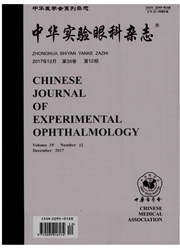

 中文摘要:
中文摘要:
背景眼表疾病导致的角膜盲已成为全球致盲性角膜疾病中的主要原因之一。随着组织工程技术的发展和进步,组织工程角膜为眼表疾病的治疗开辟了新的途径。目的观察体外培养的人脐带间充质干细胞(UC—MSCs)移植到兔角膜基质后的分化发育情况,探讨人UC-MSCs分化为角膜上皮细胞以及治疗兔角膜损伤的可行性。方法获取人脐带组织,采用Ⅳ型胶原酶消化法分离纯化人UC—MSCs并传代,取第3代细胞用于扩增和实验。流式细胞仪检测细胞的免疫表型及诱导成骨分化鉴定。24只新西兰大白兔按随机数字表法随机分为2个组,将人UC—MSCs接种于去上皮的猪角膜基质上,培养4d后行实验组兔左眼板层角膜移植;对照组以相同的手术方法单纯移植去上皮猪角膜基质。术后对角膜定期行活体激光共焦显微镜检查,并分别于术后2、4、8周摘除各组实验眼行组织病理学和免疫荧光检查,评价移植到兔角膜基质的人UC-MSCs的存活、分化以及移植局部的反应等;应用免疫荧光技术检测移植后角膜上皮细胞中角蛋白3(CK3)、CKl2以及转运蛋白G超家族成员(ABCG2)的表达。结果消化培养的人UC—MSCs呈圆形,细胞胞体较大,贴壁后细胞呈长梭形。培养获得的人UC—MSCs的细胞表型CD105^+/CD29^+/CD44^+/CD34^-/CD45^-,并可诱导分化为成骨细胞。实验组人ISC—MSCs接种到去上皮猪角膜基质后贴附良好、生长迅速,术后植片在植床上存活良好,种植了人UC-MSCs的去上皮猪角膜移植到兔眼,可见实验组受体角膜较对照组透明,未见明显新生血管,在活体共焦显微镜下可见新生的角膜上皮样细胞,未发生免疫排斥反应。免疫荧光检测可见在重建的角膜上皮层检测到CK3及CKl2的阳性表达,而未见ABCG2的表达。结论将种植了人UC—MSCs的猪角膜基质移植到损伤的兔角膜后,人UC—MS
 英文摘要:
英文摘要:
Background Corneal blindness caused by ocular surface disease is one of the main reasons for the global blinding corneal diseases. With the development and progress of tissue engineering technology, tissue- engineered cornea offers a new approach to the treatment of ocular surface disease. Objective This study was to observe the growth and differentiation of human umbilical cord mesenehymal stem cells (UC-MSCs) on the corneal stroma of receipts and investigate the feasibility of human UC-MSCs differentiated into corneal epithelium-like cells and the reparation of injury cornea. Methods Human UC-MSCs were isolated from human umbilical cord using collagenase 1V digestion and passaged in DMEM/F12 containing fetal bovine serum in vitro. The immunophenotype of cultured human UC-MSCs was evaluated by flow cytometry. The differentiated osteoblasts from the human UC-MSCs by directional induce was identified. Twenty-four New Zealand albino rabbits were randomly divided into 2 groups. The human UC-MSCs were cultured on porcine corneal matrix without corneal epithelium for 4 days and then transplanted onto the 12 left eyes of 12 New Zealand albino rabbits, and porcine corneal matrix without corneal epithelium was transplanted onto the left eyes of other 12 New Zealand albino rabbits as control group. The rabbits received keratoplasty were examined using in vivo confocal microscope through focusing(CMTF). The eyeballs were taken off after 2,4 and 8 weeks, the growth and differentiation, expression of cytokeratin 3 (CK3), CK12 and ATP-binding cassette superfamily G memben 2 (ABCG2)of human UC-MSCs were observed by histopathology and immunofluorescence staining. This use of the experimental animals complied with ARVO Statement. Results Digestive human UC- MSCs formed round in shape and was large in size. The attached cells displayed long-fusiform shape like fibroblasts. The cultured human UC-MSCs phenotype was CD105+/CD29+/CD44+/CD34 /CD45 and could be induced toward osteoblast differentiation under the a
 同期刊论文项目
同期刊论文项目
 同项目期刊论文
同项目期刊论文
 期刊信息
期刊信息
